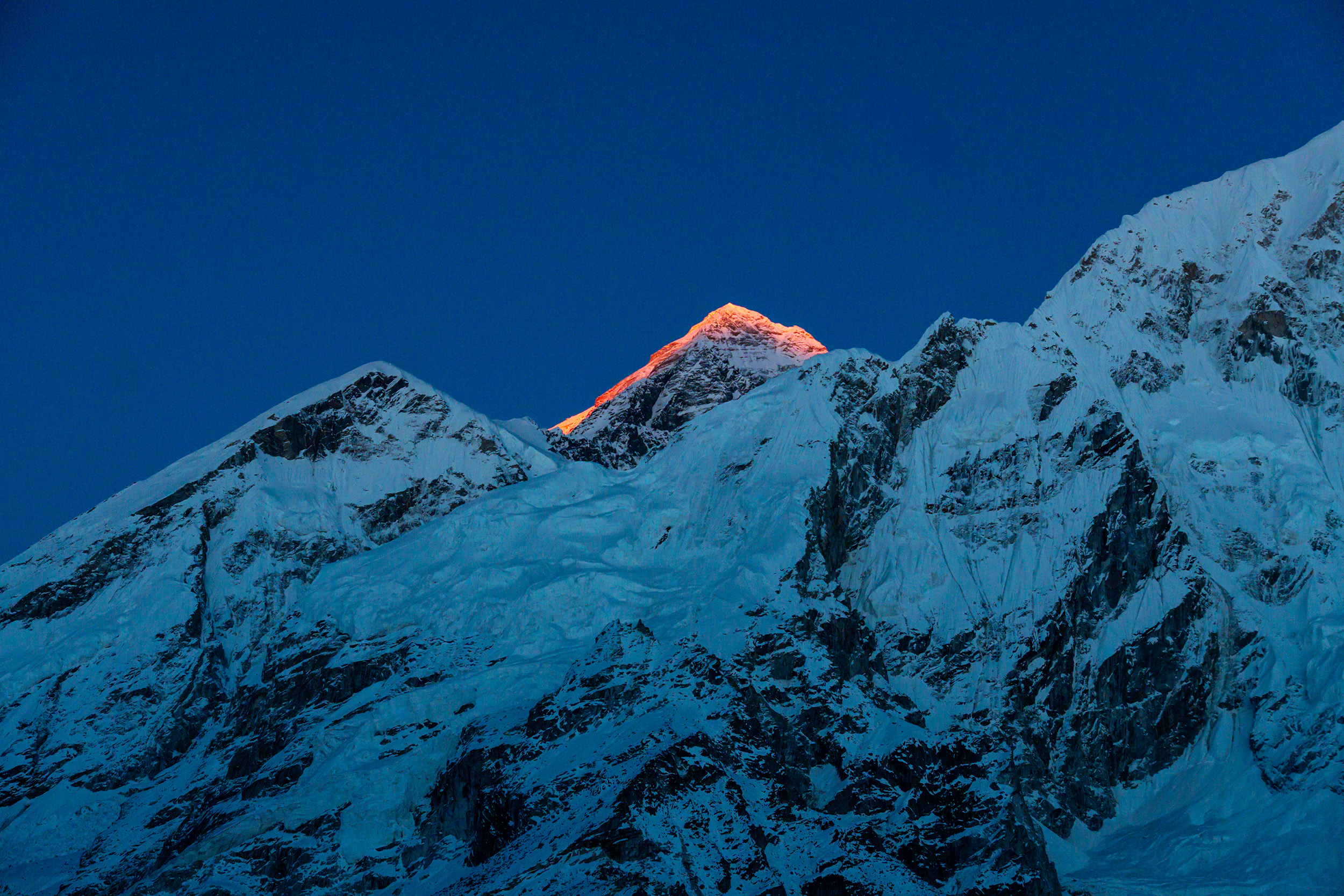 " alt="Everest Base Camp Trek
" alt="Everest Base Camp Trek
Everest Base Camp Trek
Embark on the legendary Everest Base Camp trek, a journey that promises breathtaking vistas and unparalleled adventure. Traverse rugged mountain trails, winding through Sherpa villages and ancient monasteries, as you ascend to the foothills of the world’s highest peak. Marvel at the majestic Himalayan landscape, with its towering peaks and cascading glaciers, culminating in an awe-inspiring view of Mount Everest itself. Each step brings you closer to the heart of the Himalayas, an experience that will stay with you for a lifetime.
FAQ
1. What is the best time to do the Everest Base Camp trek?
The best time for the Everest Base Camp trek is during the pre-monsoon (spring) and post-monsoon (autumn) seasons, usually from March to May and September to December. These months offer stable weather conditions and clear skies for optimal trekking experiences.
2. Is it necessary to hire a guide or porter for the Everest Base Camp trek?
While it’s not mandatory, hiring a guide or porter can enhance your trekking experience. Guides provide valuable insights into the local culture, geography, and history, while porters can ease the burden of carrying heavy loads, allowing you to focus on enjoying the journey.
3. How difficult is the Everest Base Camp trek?
The Everest Base Camp trek is considered moderately difficult. While the trails are well-defined, trekkers must be prepared for steep ascents, rocky terrain, and high altitude. Adequate physical fitness and acclimatization are essential for a safe and enjoyable trek.
4. What kind of accommodation can I expect during the trek?
Accommodation along the Everest Base Camp trek varies from basic tea houses to more comfortable lodges in popular trekking areas. Tea houses typically offer shared rooms with basic amenities such as beds, blankets, and communal dining areas. It’s advisable to carry a sleeping bag for added warmth and comfort.
5. How should I prepare for high altitude during the trek?
Proper acclimatization is crucial when trekking to high altitudes. It’s essential to ascend gradually, stay hydrated, and listen to your body’s signals. Taking rest days for acclimatization and being aware of symptoms of altitude sickness are important for a safe trekking experience.
6. What essential items should I pack for the Everest Base Camp trek?
Some essential items to pack include trekking gear (hiking boots, warm clothing, rain gear), personal medication, a first aid kit, a headlamp or flashlight, sunscreen, sunglasses, a water purification system, and snacks. Packing light yet adequate for varying weather conditions is key.
7. Are there any health risks associated with the Everest Base Camp trek?
Altitude sickness is the primary health risk associated with the Everest Base Camp trek. Other risks include gastrointestinal issues, dehydration, and injuries from falls or overexertion. Trekkers should be mindful of their health, stay hydrated, and seek medical attention if experiencing severe symptoms.
8. Do I need travel insurance for the Everest Base Camp trek?
While travel insurance is not mandatory, it’s highly recommended for the Everest Base Camp trek. Travel insurance can cover medical emergencies, evacuation, trip cancellations, and other unforeseen circumstances, offering peace of mind during your trek.
Itinerary
Day 1 : Arrival in Kathmandu
Arrive at Kathmandu Airport (1350m).
Transfer to Hotel by private van.
Accommodation: Hotel
Meals: Breakfast
Briefing about the trek in the evening.
Day 2 : Flight to Lukla, Hike to Phadking
Early morning flight to Lukla (weather permitting).
Hike to Phadking (2650m), 3-4 hours.
Accommodation: Lodge
Meals: Breakfast, Lunch, Dinner
Day 3 : Trek to Namche Bazaar
Trek to Namche Bazaar (3440m), 5-6 hours.
Accommodation: Lodge
Meals: Breakfast, Lunch, Dinner
Day 4 : Acclimatization in Namche, Hike to Khumjung
Day hike to Khumjung (3800m), explore Hillary School.
Return to Namche Bazaar.
Accommodation: Lodge
Meals: Breakfast, Lunch, Dinner
Day 5 : Trek to Tengboche
Trek to Tengboche (3860m), 5-6 hours.
Visit Tengboche Monastery.
Accommodation: Lodge
Meals: Breakfast, Lunch, Dinner
Day 6 : Trek to Dingboche
Trek to Dingboche (4410m), 4-5 hours.
Accommodation: Lodge
Meals: Breakfast, Lunch, Dinner
Day 7 : Acclimatization Day, Hike to Nagerjun Hill
Day hike to Nagerjun Hill (5100m), 4-5 hours.
Return to Dingboche.
Accommodation: Lodge
Meals: Breakfast, Lunch, Dinner
Day 8 : Trek to Lobuche
Trek to Lobuche (4910m), 5-6 hours.
Visit Dughla Memorial.
Accommodation: Lodge
Meals: Breakfast, Lunch, Dinner
Day 9 : Trek to Everest Base Camp, return to Gorakshep
Trek to Everest Base Camp (5364m), then to Gorakshep (5160m), 5-6 hours.
Accommodation: Lodge
Meals: Breakfast, Lunch, Dinner
Day 10 : Hike to Kalapatthar, trek to Pheriche
Early morning hike to Kalapatthar (5545m) for sunrise views.
Trek down to Pheriche (4210m), 8 hours.
Accommodation: Lodge
Meals: Breakfast, Lunch, Dinner
Day 11 : Trek to Namche Bazaar
Trek to Namche Bazaar (3440m), 6-7 hours.
Accommodation: Lodge
Meals: Breakfast, Lunch, Dinner
Day 12 : Trek to Lukla
Trek to Lukla (2860m), 6-7 hours.
Accommodation: Lodge
Meals: Breakfast, Lunch, Dinner
Day 13 : Fly back to Kathmandu
Morning flight from Lukla to Kathmandu.
Accommodation: Hotel
Meals: Breakfast
Day 14 : Kathmandu Sightseeing
Heritage sightseeing in Kathmandu Valley.
Leisure time for shopping and relaxation.
Accommodation: Hotel
Meals: Breakfast
Day 15 : Departure
Transfer to Kathmandu Airport for departure.
Meals: Breakfast
Join us at Himalayan Sherpani Adventure and discover the true spirit of the Himalayas.